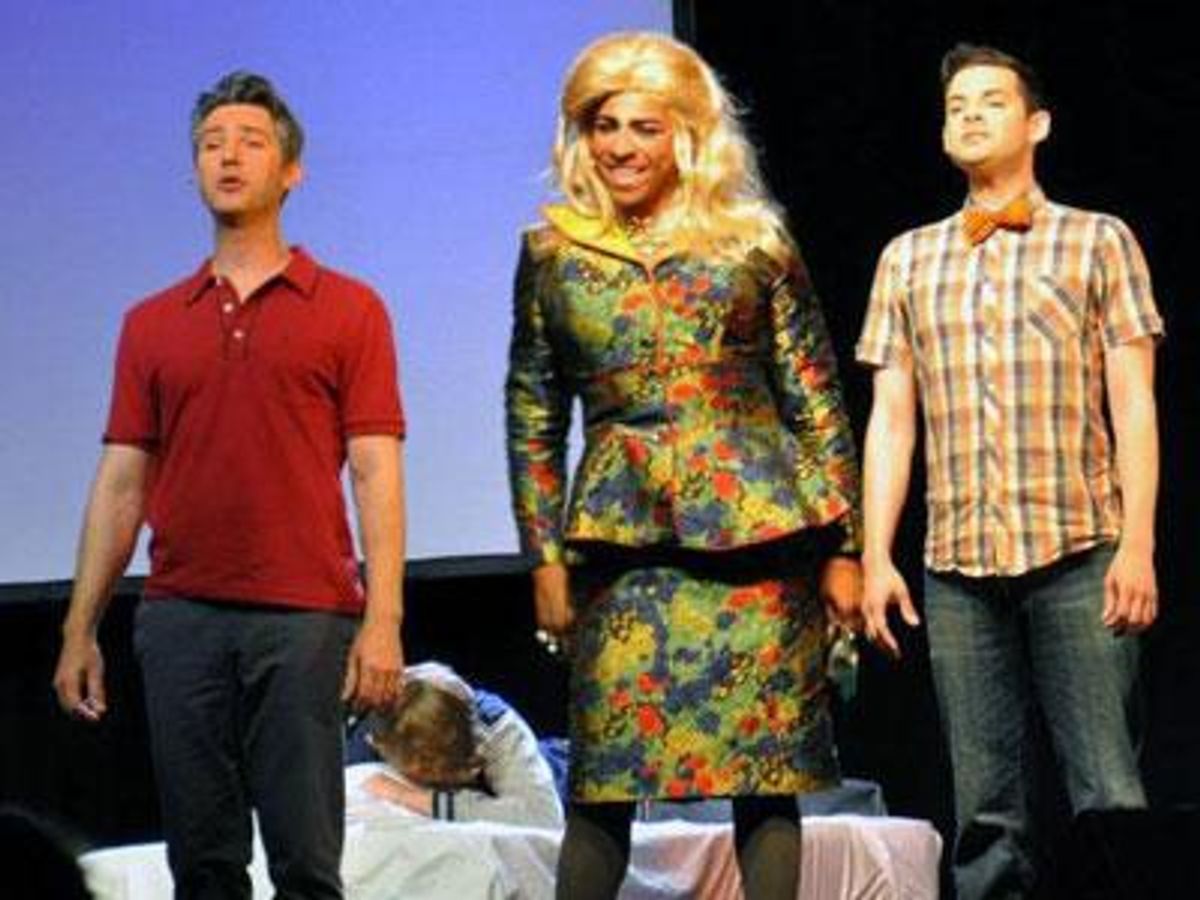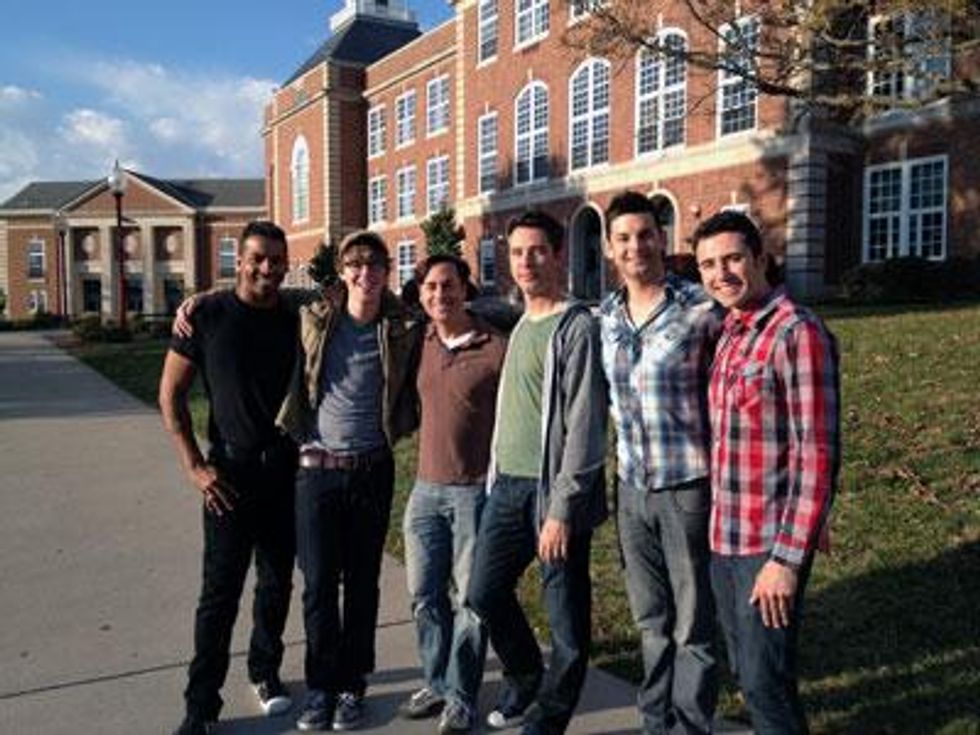Last week in Iowa City I realized the LGBT movement spends too much effort preaching to gay urban audiences. We need to invest more time gathering support from straight neighbors, especially in suburban and rural areas, so that LGBT acceptance becomes a full community affair.
Although I was cold from the rain during my few days in Iowa City, my heart was warm from seeing firsthand a local community energized to advance LGBT acceptance.
That was the impact of it gets better, a new touring live stage work that premiered last Friday at the University of Iowa. A collaboration of the online It Gets Better Project, Gay Men's Chorus of Los Angeles and Speak Theater Arts, the show depicts the need to help LGBT youth with a blend of theater, music, and multimedia. But it also adds a vital dose of community by interacting - both on and off stage - with straight and LGBT students, teachers, residents and singers from the town.
I've been active in gay causes for many years. I served on the board of an LGBT political organization. I attend fundraising events and blog about rights issues. And if you've got the latest funny pro-gay meme, I will gladly share it across Facebook and Twitter. But often, I find myself and fellow advocates delivering our message to the same people: gay friends and loyal straight allies in big metropolises such as Los Angeles, New York, and San Francisco. I accept my own responsibility for that. Like many gay men, I like the comfort of big cities and don't often stray far from my gayborhoods. Indeed, after departing their suburban or rural hometowns, it's hard for many LGBT people to look back.
That's why I was so intrigued when Liesel Reinhart, the writer/director of it gets better first talked to me about helping produce the show. Liesel is one of my most creative friends, so I expected innovative ideas. Right away, it was clear that her priority was to engage local communities. The show would tour around the country - not just to gay meccas, but to smaller cities and towns where the "It Gets Better" message is most needed. That's why places like Iowa City and Lawrence, Kansas are on the itinerary.
In each tour stop, the show is preceded by a week of outreach activities. In Iowa, the cast members visited gay-straight alliances at Iowa West and City high schools (where one of the groups is superbly named GLOW - Gays, Lesbians Or Whatever). At the University of Iowa, they spoke to graduate education students about teachers' responsibility to create a bully-free learning environment for all students. After the show's technical rehearsal and premiere performance, they held Q&A sessions with the public. Engaging community dialogue is a critical component of the tour.
And during the show itself, the community is brought on stage, both virtually and literally. Voices of some local residents are heard when their own It Gets Better videos are played, and they are brought up to speak directly to the audience. In one of the most powerful moments, a local choir arrives on stage to tell LGBT kids, through song, that "You Have More Friends Than You Know."
With these novel twists, the it gets better tour does not just speak to a passive audience. It depends on the community to get actively involved. And it asks the all-important question - once the show leaves, what will local residents do to help their LGBT youth?
That critical question must be answered to solve not just bullying of LGBT youth, but to achieve progress across all LGBT issues. Even when a show like it gets better comes to the heartland, it doesn't have all the answers. The answers already lie somewhere within each community, and the tour's job is to motivate the residents to discover and share those answers for themselves.
It is the local residents who must continue the dialogue after the tour packs up its last costume. They are the ones who must talk face to face with the bullies, who must open the minds of intolerant neighbors, and who can show gay kids they have more friends than they know.
 The cast of the it gets better show visits the gay-straight alliance at City High School in Iowa City.
The cast of the it gets better show visits the gay-straight alliance at City High School in Iowa City.
This lesson is evident from two recent bullying incidents targeted not at LGBT kids, but at straight women. In West Branch, Michigan, high school sophomore Whitney Kropp was elected to her high school's homecoming court as a prank by vindictive classmates. Across the Great Lakes, in Lacrosse, Wisconsin, local morning anchor Jennifer Livingston received an email from a casual viewer who complained that she had a "community responsibility" to lose weight to be a role model for young girls. Though bullied for different reasons, Whitney and Jennifer shared one thing in common: their communities rallied to support them.
Both women received words from people in their hometowns, on Facebook, and across the nation as their stories spread. Whitney Kropp even got what every girl loves - a dream makeover sequence from local business owners. The vast public response convinced Whitney to shine at her homecoming game rather than stay home. For Jennifer Livingston, it emboldened her to speak out on-air against the viewer who complained about her weight and against all forms of bullying. Both women drew strength to stand up against bullies because their communities reminded them they are worthy.
We need towns across America to do the same for LGBT citizens. The it gets better tour provides a model for helping activate communities to do so. In each destination, the tour delivers hope to LGBT residents. In Iowa City, the high school GSA students clamored for the cast members to stay longer. During the after-show Q&A session, one lesbian tearfully told her story about her parents refusing to attend her wedding, and asked for advice on how to overcome religious opposition to homosexuality. A community chorus singer posted to the tour's Facebook page that the cast's weeklong visit and the show "indelibly touched me and changed my life... If I can, in any way, affect a change in someone's world, know that you are part of the collective experiences that got me to that moment."
But even more compelling was the response from straight residents. When the cast visited teachers in training at the University of Iowa, straight graduate students told their own stories - of watching a friend come out, of seeing bullying, and of their evolution to become more accepting of gay people. Afterward, the University of Iowa Teacher Leader Center thanked the tour with this Facebook post: "You inspire, you lead, and you remind us that we have a tremendous obligation to make schools and classrooms safe for all kids."
In the show, cast member Drew Tablak touches upon religious views of homosexuality. He recounts his own journey to accept that he can be both gay and Christian, and then he sings a religious hymn. In Iowa City, that moment received some of the loudest applause from the more than 400 (mostly straight) audience members.
In the post-show Q&A session, a former high school English teacher explained that after her son came out, her school administration did not like her discussing gay issues in the classroom. Her story reminded neighbors that more work must be done even in their progressively-viewed city.
Imagine if these kinds of reaction could swell in hamlets, towns and cities across America. When a gay boy is bullied in school, imagine his neighborhood telling him that he is wanted. If a lesbian woman is mistreated at work, imagine her co-workers empowering her to stand up. If a transgender person suffers discrimination, imagine if neighbors simply offered a kind gesture. For the targeted LGBT person, the impact could be life-changing. For local residents, the effect would incrementally make the community better.
But we can't expect this to happen on its own. Although LGBT non-profit organizations are resource-strapped, they can help by directing more attention to smaller towns. For urban gay denizens, we need to get out of our gay safety zones and reach out to suburban and rural places across America. Just as in Iowa City, we must motivate residents to speak up, ask questions, and explore solutions.
Along the way, we urbanites might even learn a lesson or two - just as we did in Iowa City. The LGBT residents, especially students in the high school GSAs, were not as judgmental of each other as I might see in West Hollywood. And across each letter of the LGBT acronym, they had much closer ties than in big gay meccas where L, G, B and T often go separate ways.
By starting a dialogue, we discovered that we have as much to learn as we have to teach. We must now count on local residents (and us) to keep the conversation going. That's how we turn LGBT acceptance into a truly community affair.
For information about the it gets bettertour, go to: https://www.itgetsbettertour.org/ or its Facebook page at https://www.facebook.com/ItGetsBetterMusical
JIMMY NGUYEN is a creative producer of the "it gets better" show. He is nationally-recognized as an award-winning lawyer, new media expert, LGBT & diversity advocate, media commentator and motivational speaker. In 2008, Lawdragonnamed Nguyen one of the 500 Leading Lawyers in America, and in 2010, The Advocatenamed him to its Forty under 40 list of top LGBT persons. He writes for his own website at JimmyWin.com. Follow him on Twitter @JimmyWinMedia.


 The cast of the it gets better show visits the gay-straight alliance at City High School in Iowa City.
The cast of the it gets better show visits the gay-straight alliance at City High School in Iowa City.















































































Viral post saying Republicans 'have two daddies now' has MAGA hot and bothered